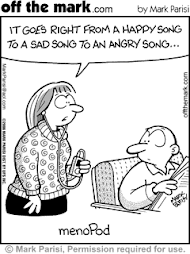Exploring the views of menopause from a different cultural perspective.
In the United States broadly speaking, it is conventional to perceive psychological and social factors of menopause. Many women are victims of health care system where their symptoms regarding pre-menopause are not taken into consideration. In fact according to an article posted in Discovery health it was stated that, “had to deal with the negative consequences of the “it’s all in your head, dearie.” syndrome.” Consequently, in countries like Australia, a psychological syndrome doesn’t seem to be much detested. It is part of an integrated, or "multidimensional," approach to Woman's health care. This does not mean that the biological aspects of the transition should be ignored; the biological characteristics and phenomenon cannot be voluntarily eradicated from a woman’s total psychological and social well-being. Menopause across Cultures the type and prevalence of symptoms women exhibit during pre-menopause and menopause are often related to cultural background. For instance, the hot flash is the most common symptom of Western city dwellers; however, hot flashes are so uncommon in Japan that there is no Japanese word for it. Various hypotheses have been speculated from researched as to why Japanese women do not have hot flashes. One hypothesis is the Japanese diet, which is replenished with vegetables and soy which provides some measure of prevention. Another hypothesis is that Japan's cultural respect for older people makes the menopausal transition more comfortable for women; the menopausal woman, then, is moving into a place of honor, rather than being pushed aside into a place of invisibility as frequently occurs in Western youth-oriented cultures. Research has found that when women hold roles that they consider important, they have fewer symptoms of menopause. This latter hypothesis might look good at first glance, but it is not the case, as claimed widely over the Internet, that Japanese women have no symptoms of menopause. Their symptoms are merely different. Woman's fears and concerns about menopause also vary by culture. Muslim Arab women fear a loss of their spouses' sexual interest when they can no longer have children. Near Eastern Jews worry about a loss of physical health; European women worry about their mental health. American women fear losing control of their emotions and becoming emotional wrecks. Regardless of culture and country of origin, all women the world over will experience menopause should they live to that point in their lives. It is interesting to consider the differences in menopausal symptoms, and to glean information from the research that might help any woman manage this transition in a life-affirming way.
References: Vanda, Dr. (2008 , September 10). Woman's health center.
Subscribe to:
Post Comments (Atom)









Great insight to menapause in American culture. As a woman in her early fourties I can relate. The last two visits I have made to my general practicioner about fatigue and just not feeling well in general secondary to sleepless nights my doctor asked me if I was depressed. I told him I didn't feel like I was depressed just tired and if he asked me that one more time, I might have to punch him. This has been very frustrating to me and has forced me to do a lot of research for alternative methods of relief. I do look forward to being through menapause completely.
ReplyDeleteAs I read you post I was shocked to hear that there is no such word for “hot flashes” in Japan. Also, it is great to know that by keeping busy or holding roles that are important women can have fewer symptoms of menopause. Great post!
ReplyDeleteMonica L.